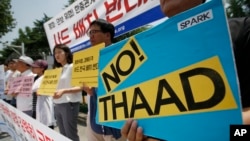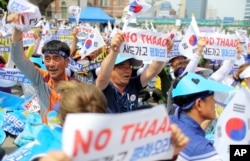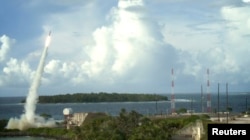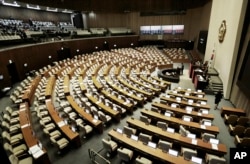Opposition to the deployment of the U.S. Terminal High-Altitude Area Defense (THAAD) anti-missile system is weakening in South Korea’s National Assembly in the face of North Korea’s rapid advancement of it nuclear and ballistics missile capabilities.
“In the aftermath of the fifth nuclear test of North Korea and the firing of the SLBM [Submarine Launch Based Missile], I have felt a little bit of change in the National Assembly towards THAAD deployment,” said Chung Sye-kyun, the speaker of the National Assembly in Seoul.
THAAD is a missile defense battery designed to intercept and destroy incoming ballistic missiles during their final, or terminal, phase of flight. It has so far proven effective against short- and medium-range ballistic missiles.
Past protests
Seoul and Washington agreed in July to deploy the system on the Korean peninsula at a time when North Korea was test-firing missiles on almost a weekly basis.
While opinion polls showed more than 50 percent public support for the anti-missile shield, the announcement to deploy THAAD sparked angry protests in Seoul and in the area where the battery was to be stationed.
Communities near the site voiced concern that they would become likely targets for a North Korean strike if hostilities broke out, and that THAAD could endanger the health and safety of people living nearby, especially from radiation exposure from the systems’ powerful radar emissions.
The leader of South Korea’s main opposition party, the Minjoo Party of Korea, which holds a majority in the National Assembly, also came out against THAAD in August, arguing that it will needlessly antagonize relations with China.
China paradox
Beijing has voiced strong opposition to stationing the American missile defense system in South Korea on the grounds that THAAD’s powerful radar could be used against them, and that its deployment increases the U.S. military’s power in the region.
There was growing concern over the summer that China might economically retaliate against South Korea or withdraw its support for international sanctions imposed on North Korea.
Beijing’s criticism has been toned-down in the wake of North Korea’s fifth nuclear test and indications that it is preparing another long-range rocket launch in violation of a U.N. ban on its nuclear and missile development programs.
China continues to support using international sanctions to induce North Korea to engage in dialogue, but at the same time it does not want to induce instability or collapse of the Kim Jong Un government.
Exercising a humanitarian exception in the sanctions, China has actually increased imports of North Korea coal in recent months.
And Beijing has denounced a U.S. Treasury decision this week to sanction a Chinese company, the Dandong Hongxiang Industrial Development Company, for allegedly doing business with North Korean officials and organizations connected to its weapons program.
Legislative oversight
As Speaker of the National Assembly, Chung Sye-kyun is not supposed to take sides on a political issue like THAAD. But he has been critical of President Park Geun-hye’s decision to deploy the controversial system without consulting the legislative branch.
“The government should have engaged in sufficient or proper communication with the general public and the National Assembly, and also the government has to make some diplomatic efforts with neighboring countries who are opposed to the deployment of the anti-missile system,” he said.
Even though Park’s ruling Saenuri Party lost its majority status in this year’s legislative elections, the executive branch has broad discretionary powers to deal with national security threats and foreign affairs.
U.S. Assistant Secretary of State for East Asia Daniel Russel said on Tuesday Washington would will speed up the THAAD deployment to South Korea, “given the accelerating pace of North Korea's missile tests.”
Youmi Kim in Seoul contributed to this report.








